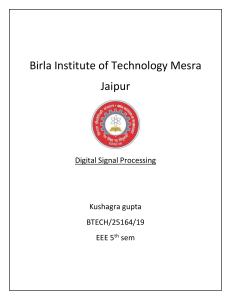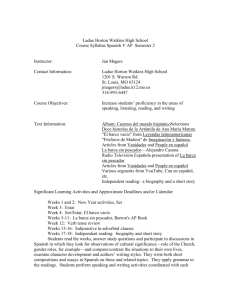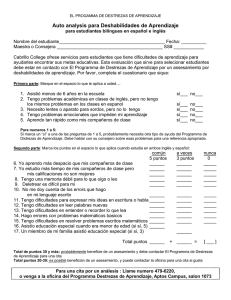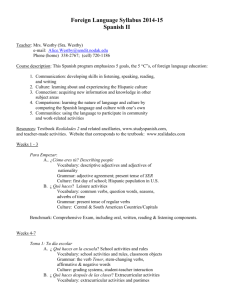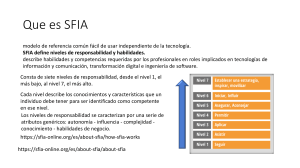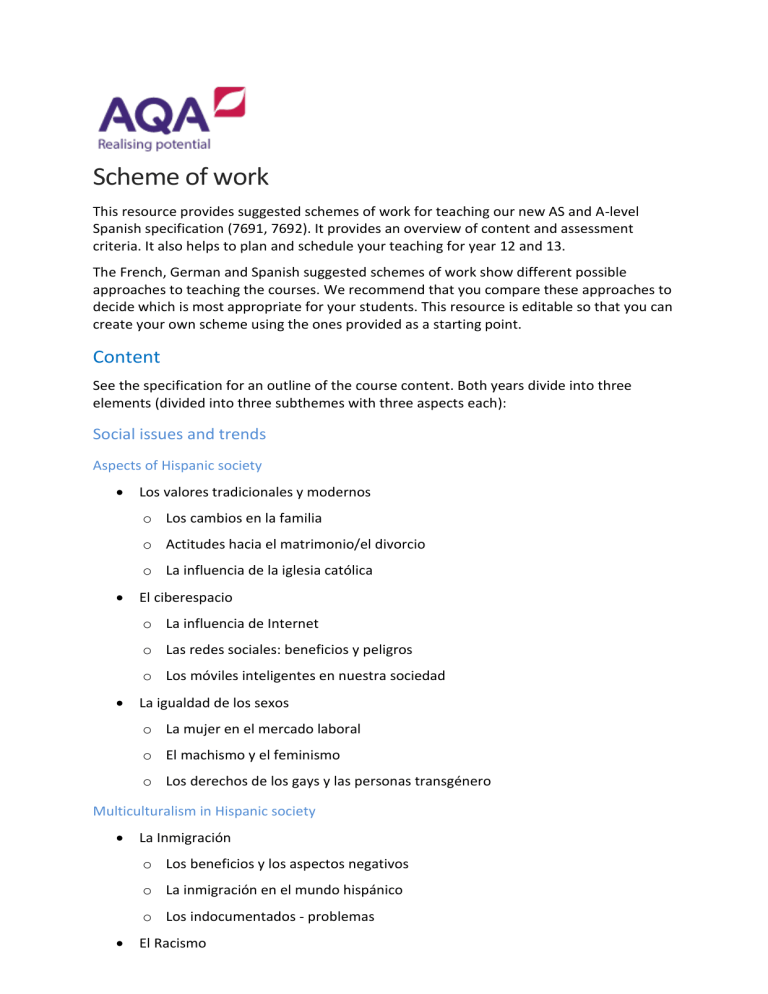
Scheme of work This resource provides suggested schemes of work for teaching our new AS and A-level Spanish specification (7691, 7692). It provides an overview of content and assessment criteria. It also helps to plan and schedule your teaching for year 12 and 13. The French, German and Spanish suggested schemes of work show different possible approaches to teaching the courses. We recommend that you compare these approaches to decide which is most appropriate for your students. This resource is editable so that you can create your own scheme using the ones provided as a starting point. Content See the specification for an outline of the course content. Both years divide into three elements (divided into three subthemes with three aspects each): Social issues and trends Aspects of Hispanic society Los valores tradicionales y modernos o Los cambios en la familia o Actitudes hacia el matrimonio/el divorcio o La influencia de la iglesia católica El ciberespacio o La influencia de Internet o Las redes sociales: beneficios y peligros o Los móviles inteligentes en nuestra sociedad La igualdad de los sexos o La mujer en el mercado laboral o El machismo y el feminismo o Los derechos de los gays y las personas transgénero Multiculturalism in Hispanic society La Inmigración o Los beneficios y los aspectos negativos o La inmigración en el mundo hispánico o Los indocumentados - problemas El Racismo o Las actitudes racistas y xenófobas o Las medidas contra el racismo o La legislación anti-racista La Convivencia o La convivencia de culturas o La educación o Las religiones Political and artistic culture Artistic culture in the Hispanic world La influencia de los ídolos o Cantantes y músicos o Estrellas de televisión y cine o Modelos La identidad regional en España o Tradiciones y costumbres o La gastronomía o Las lenguas El patrimonio cultural o Sitios turísticos y civilizaciones prehispánicas (Machu Picchu, la Alhambra) o Arte y arquitectura o El patrimonio musical y su diversidad Aspects of political life in the Hispanic world Jóvenes de hoy, ciudadanos de mañana o Los jóvenes y su actitud hacia la política : activismo o apatía o El paro entre los jóvenes o Su sociedad ideal Monarquías y dictaduras o La dictadura de Franco o La evolución de la monarquía en España o Dictadores latinoamericanos Movimientos populares o La efectividad de las manifestaciones y las huelgas o El poder de los sindicatos o Ejemplos de protestas sociales (El 15-M, las madres de la Plaza de Mayo) Works one work for AS a total of two works for A-level. Planning Phases of learning – year 12 Phase 1 For the first two years of teaching new specification, students will need to gain new skills, different from GCSE, which focused on controlled assessment. We recommend these teaching steps: separate writing and speaking from memorising and learning by heart grammar learning for writing and speaking grammar programme links with the new specification thematic aspects Phase 2 Introduction to reading and listening skills developed through theme-related texts and materials. There is also study of either a film or a book. Framework for developing: vocabulary comprehension skills, including summary-writing essay-writing skills in the context of the chosen work speaking skills translation skills, both from and into the target language. Phase 3 Year 12 programme offers two directions: a. catering for the students entered for AS assessment at the end of year 12, provides thorough exam preparation b. catering for students by-passing this assessment and working towards the full 2 year Alevel. Phases of learning – year 13 Phases 1 and 2 Practice in: speaking comprehension skills transfer of meaning skills linked to the themes in the second year programme. Both phases provide framework for the study of the second work and the essay-writing assessment. The two phases have been separated based on different allocation of weekly contact time. Phase 3 Teaching-time devoted to the independent research carried out by the students. The research task is a significant part of speaking assessment. Phase 4 Intensive practice of assessment and exam skills and tasks. Scheduling phases year 12 and 13 Year 12 Time Phase Content September – October halfterm Phase 1: intensive grammar programme linked to thematic content. Aspects of Hispanic society: social issues and trends November – February halfterm Phase 2: development of all skills through theme-linked teaching and learning. Aspects of Hispanic society: social issues and trends Artistic culture in the Hispanic world Artistic culture in the Hispanic world Chosen film or book February – study leave (for those taking AS exams) February – end Phase 3a: practice of exam-specific skills and assessment tasks in speaking, essay writing, listening, reading, summary writing and translation into and from target language. Content focus according to assessment tasks: Phase 3b: 'top up’ teaching on film Transition between year 12 work essay-writing on book or film speaking and stimulus cards reading, listening and translation according to subthemes and aspects. Time Phase Content of year or book for A-level needs. (sub-themes) and year 13. (for those bypassing AS or taking AS en route to Alevel exams) Developing skills in speaking, essay writing, listening, reading and translation into and from target language. Explore independent research possibilities. Year 13 Time Phase Content September – October Phase 1: development of skills in the two theme areas of year 13. Intensive first phase of teaching and learning for the second work. Aspects of Hispanic society: social issues and trends Aspects of political life in the Spanish-speaking world Study of second work. October – December Phase 2: as for phase 1 with less time spent on the 2nd work and more time spent on social issues. Aspects of Hispanic society: social issues and trends. Aspects of political life in the Spanish-speaking world. Study of second work. January – March Phase 3: phase 1 and 2 continued. Content and skills practice with independent research (ie outcomes are shared with teacher, planning and preparation for speaking). The content and skills aspects of the A-level course are now completed. March – study leave Phase 4: intensive and comprehensive exam preparation. All skills targeted on a timely basis according to the needs and priorities of the schedule of the exams. Teaching time and staffing Suggested schemes of work have been prepared for the following teaching time: Weekly contact time for both AS and A-level: 5 hours per week Number of weeks for AS course prior to study leave: 30 weeks Number of weeks for A-level course in year 12: 35 weeks Number of weeks for A-level course in year 13: 30 weeks Two teachers Two teachers will share the teaching of the group: Teacher A - 3 hours contact time Teacher B - 2 hours contact time. One teacher One teacher will be teaching the group the whole of the 5 hours. Co-teaching The essay questions on the films and books have different requirements at AS and A-level. One possible method of dealing with this is to co-teach AS and A-level students to AS level, and then, after AS students have finished year 12, ‘top up’ the remaining A-level students. Assessment Time allocated to the various demands of the course reflects the weightings given to the different assessments or examinations. Assessment has been divided into 2 main areas for the AS course and 3 main areas for the A-level course: AS: 1. Essay writing skills and the study of the work (film or book) 17.5% 2. All other skills 82.5% A-level: 1. Essay writing skills and the study of 2 works (film + book or 2 books) 20% 2. All other skills 80% (including the research project) 3. Time needed to support and oversee independent research project for the speaking assessment Assessment of cultural knowledge Students will not be expected to rely on any particular cultural knowledge in comprehension tasks. However, they are assessed on some new features in the listening and reading, such as summary writing and a return to quality of language. In the speaking test (AO4) students demonstrate what they know of the culture and society whose language they have studied. In the essays on films and books, they will be assessed on the knowledge of the films and books as AO4. Sub-themes and their aspects provide a framework for developing and extending lexical and grammatical knowledge. Schemes of work Themes and grammar In these schemes of work, we recommend to have a verb or vocabulary test every week. Year 12 co-teaching AS and A-level Phase Theme Grammar Phase 1 (6 weeks in total): Grammar revision and new grammar - grammar sessions are linked to the sub-themes within the themes of social trends and artistic culture. Revision of the grammatical material: nouns, articles, adjectives, use of tenses (regular and most common irregular forms), pronouns, adverbs, prepositions, personal ‘a' El ciberespacio Present tense/present continuous tense weeks 1 6 Phase 2 (18 weeks in total): o La influencia de Internet Weeks 7 9 o Las redes sociales: beneficios y peligros Uses of ser and estar Adjectives comparative and superlative o Los móviles inteligentes en nuestra sociedad Phase 2: weeks 10 11 Los valores tradicionales y modernos o Los cambios en la familia Imperfect/imperfect continuous tense Preterite tense o Actitudes hacia el matrimonio/el divorcio o La influencia de la iglesia católica Phase 2: Study of film or text. Future and conditional tense Demonstrative (eg este, ese, aquel) adjectives weeks 12 15 Possessive adjectives (eg mi/mío) Phase 2: weeks 16 17 La igualdad de los sexos o La mujer en el mercado laboral o El machismo y el feminismo o Los derechos de los Perfect, pluperfect, future perfect and conditional perfect Indefinite adjectives (eg alguno, ninguno, cualquiera, etc) Phase Theme Grammar gays y las personas transgénero One lesson a week is dedicated to study of film or text Phase 2: La influencia de los ídolos o Cantantes y músicos weeks 18 19 Use of the passive voice Use of direct and indirect object pronouns Use of the subjunctive Numerals Use of the subjunctive (continued) The imperative o Estrellas de televisión y cine o Modelos One lesson a week is dedicated to study of film or text Phase 2: La identidad regional en España o Tradiciones y costumbres weeks 20 21 o La gastronomía o Las lenguas One lesson a week is dedicated to study of film or text Phase 2: El patrimonio cultural o Sitios turísticos y civilizaciones prehispánicas: Machu Picchu, la Alhambra, etc weeks 22 24 o Arte y arquitectura o El patrimonio musical y su diversidad One lesson a week is dedicated to study of film or text Phase 3a (6 weeks in total): weeks 25 30 Intensive practice of skills for exam and assessment: speaking. Intensive practice of essay-writing skills. Year 12 – A-level only Phase Theme Grammar Phase 1 (6 Grammar revision and new weeks in total): grammar grammar sessions are linked to the sub-themes within weeks 1 6 the themes of social trends and artistic culture Phase 2 (18 weeks in total): weeks 7 9 El ciberespacio o La influencia de Internet o Las redes sociales: beneficios y peligros Revision of the grammatical material needed for learners to begin to perform more independently and autonomously in speaking and writing: nouns, articles, adjectives, use of tenses (regular and most common irregular forms), pronouns, adverbs, prepositions, personal ‘a’ Present tense/present continuous tense Uses of ser and estar Adjectives comparative and superlative o Los móviles inteligentes en nuestra sociedad Phase 2: weeks 10 11 Los valores tradicionales y modernos o Los cambios en la familia Imperfect/imperfect continuous tense Preterite tense o Actitudes hacia el matrimonio/el divorcio o La influencia de la iglesia católica Phase 2: Study of film or text Future and conditional tense Demonstrative (eg este, ese, aquel) weeks 12-15 Possessive adjectives (eg mi mío) Phase 2: weeks 16 17 La igualdad de los sexos o La mujer en el mercado laboral o El machismo y el feminismo o Los derechos de los gays y las personas transgénero Perfect, pluperfect, future perfect and conditional perfect Indefinite adjectives (eg alguno, ninguno, cualquiera) Phase Theme Grammar One lesson a week is dedicated to study of film or text Phase 2: weeks 18 19 La influencia de los ídolos o Cantantes y músicos o Estrellas de televisión y cine Use of the passive voice Use of direct and indirect object pronouns o Modelos One lesson a week is dedicated to study of film or text Phase 2: weeks 20 21 La identidad regional en España o Tradiciones y costumbres Use of the subjunctive Numerals o La gastronomía o Las lenguas One lesson a week is dedicated to study of film or text Phase 2: weeks 22 24 El patrimonio cultural o Sitios turísticos y civilizaciones prehispánicas: Machu Picchu, la Alhambra, etc. Use of the subjunctive (continued) The imperative o Arte y arquitectura o El patrimonio musical y su diversidad One lesson a week is dedicated to study of film or text Phase 3b (11 Continuation of phase 2 skills development. weeks in total): Action-planning and study skills for independent research project. weeks 25 35 'Top up' on film or book for A-level needs. Students bypassing AS or taking AS en route to Alevel exams Year 13 Phase Theme Grammar Phase Theme Grammar Phase 1 (7 La Inmigración weeks in total): o Los beneficios y los weeks 1 3 aspectos negativos o La inmigración en el mundo hispánico o Los indocumentados problemas Phase 1: weeks 4 5 Revision of common indicative tenses: present, imperfect, preterite, future, conditional, compound tenses Revision of nouns, adjectives, adverbs and prepositions. Revision of pronouns. El Racismo o Las actitudes racistas y xenófobas o Las medidas contra el racismo o La legislación antiracista Phase 1: weeks 6 7 La Convivencia o La convivencia de culturas o La educación o Las religiones Phase 2 (8 weeks in total): weeks 8 9 Jóvenes de hoy, ciudadanos de mañana Revision of the present and perfect subjunctive tenses. o Los jóvenes y su actitud hacia la política : activismo o apatía o El paro entre los jóvenes o Su sociedad ideal Phase 2: Study of set text or film. The imperfect and pluperfect subjunctive. Movimientos populares Use of the subjunctive in conditional sentences. weeks 10 13 Phase 2: weeks 14 15 o La efectividad de las manifestaciones y las huelgas o El poder de los sindicatos o Ejemplos de protestas Phase Theme Grammar sociales (eg El 15-M, las madres de la Plaza de Mayo) Phase 3 (9 weeks in total): weeks 16 18 Monarquías y dictaduras Use of the subjunctive (further work) Revision of the passive voice o La dictadura de Franco o La evolución de la monarquía en España o Dictadores latinoamericanos Phase 3: Revision of year 1 work weeks 19 21 Essay writing Consolidation of all grammar through: Supporting students in independent research essay writing speaking activities Phase 3: Further work on year 2 work translations weeks 22 24 Essay writing reading and listening activities Supporting students in independent research Phase 4 (6 Intensive practice of skills for exam weeks in total): and assessment: weeks 25 30 speaking with stimulus card independent research outcomes Intensive practice of essay-writing skills. Two teachers Year 12 – co-teaching AS and A-level Phase Teacher A: lesson 1 3 Phase 1: All lessons in this phase are given over to a grammar revision and new grammar focus targeted specifically at writing and speaking skills. These grammar slots form an intensive start-of-course grammar programme that supports and develops productive language skills. Grammar slots are linked to the sub-themes within the themes of social trends and artistic culture. 6 weeks Teacher B: lesson 1 2 Time allocation 30 hours towards assessment are divided equally between essaywriting skills and other skills. Phase Teacher A: lesson 1 3 Teacher B: lesson 1 2 Time allocation Phase 2: Through the thematic aspects linked to social trends teacher A develops: Through the thematic aspects linked to artistic culture teacher B develops: 18 x 2 hours for teacher A and 18 x 2 hours for teacher B - 72 hours for the development of all skills other than essay-writing. 18 weeks listening and reading comprehension skills vocabulary and grammar Teacher A provides the programme for the study of the year 12 film or book which supports the development of essaywriting skills. listening and reading comprehension skills vocabulary and grammar speaking skills based on stimulus cards speaking skills based on stimulus cards translation into and from the target language translation into and from the target language summary writing. summary writing. Phase 3a: Intensive practice of skills for exam 6 weeks and assessment: Students speaking. taking AS Independent study allows to exams target different needs of AS and A-level learners. Intensive practice of essay-writing skills 18 hours for essaywriting and the study of the work. Intensive practice of skills for exam and assessment: speaking. Independent study allows to target different needs of AS and A-level learners. 24 hours across two teachers to all other skills. Teacher B: lesson 1 2 Time allocation 6 hours allocated to essay-writing. Essay as % of total time: 26% Other skills as % of total time: 74% Year 12 – A-level only Phase Teacher A: lesson 1 3 Phase 1: Grammar revision and new grammar to develop writing and speaking skills. These grammar slots form an intensive start-of-course grammar programme that supports and develops productive language skills. Grammar slots are linked to the sub-themes within the themes of social trends and artistic culture. 6 weeks 30 hours towards assessment are divided equally between essaywriting skills and other skills. Phase Teacher A: lesson 1 3 Teacher B: lesson 1 2 Time allocation Phase 2: Through the thematic aspects linked to social trends teacher A develops: Through the thematic aspects linked to artistic culture teacher B develops: 18 x 2 hours for teacher A and 18 x 2 hours for teacher B 72 hours for the development of all skills other than essay-writing. 18 weeks listening and reading comprehension skills vocabulary and grammar Phase 3b Students bypassing AS or taking AS en route to A-level exams Teacher A provides the programme for the study of the year 12 film or book which supports the development of essaywriting skills. listening and reading comprehension skills vocabulary and grammar speaking skills based on stimulus cards speaking skills based on stimulus cards translation into and from the target language translation into and from the target language summary writing. summary writing. Continuation of phase 2 skills development. Action-planning and study skills for independent research project Actionplanning and study skills for independent research project. Continuation of phase 2 skills development. 18 hours for essaywriting and study of the work. 11 x 2 hours 22 hours for the development of all skills other than essay-writing. 11 hours added to essay-writing skills. 'Top up' on film or book for A-level needs. 22 hours for effective programme of study skills, action planning and initial research for the independent research project. Year 13 Phase Teacher A: lesson 1 3 Teacher B: lesson 1 2 Time allocation Phase 1: Through the thematic aspects linked to social Political life: through the thematic aspects 14 hours for study of the second work. This allows the 7 weeks Teacher A provides the programme Phase Teacher A: lesson 1 3 issues teacher A develops: listening and reading comprehension skills vocabulary and grammar speaking skills based on stimulus cards translation into and from the target language summary writing. Phase 2: 8 weeks Social issues: as for phase 1 for the study of the year 13 film or book which supports the development of essaywriting skills. Teacher B: lesson 1 2 linked to political life Teacher B develops: listening and reading comprehension skills vocabulary and grammar If a film has been studied in the first year of the course, a book must be studied in the second year. Work 2: as for phase 1 speaking skills based on stimulus cards Time allocation teacher and students to make rapid progress in this early stage in the year. 21 hours are spent on the social and political subthemes; more time is given to political subjects as this is a new thematic area. translation into and from the target language summary writing. Political life: as for phase 1 32 hours for skills other than essaywriting. 8 hours allocated to essay writingskills. Phase 3: 9 weeks Social issues: as for phases 1 and 2 Work 2: as for phases 1 and 2 Lesson 2: supporting students in independent research. Revision of work 1 for essay writing Political life: as for phases 1 and 2 18 hours for skills other than essaywriting. 18 hours for essaywriting allows completing year 13 work and revising year 12 work. 9 hours for supporting students in preparing their research knowledge for speaking. Phase 4: 6 weeks Intensive practice of skills for exam and assessment: Intensive practice of essay-writing Intensive practice of skills for exam and assessment: 24 hours for exam practice in skills other than essay- Phase Teacher A: lesson 1 3 Teacher B: lesson 1 2 Time allocation speaking with stimulus card and independent research outcomes. speaking with stimulus card writing skills skills. independent research outcomes. 6 hours for test essay writing practice. Essay writing as % of total time = 28% Other skills as % of total time = 72% One teacher Year 12 co-teaching AS and A-level Phase Lesson Time allocation Phase 1: 6 weeks Grammar revision and new grammar to develop writing and speaking skills. These grammar sessions form an intensive start-of-course grammar programme that supports and develops productive language skills. Grammar slots are linked to the sub-themes within the themes of social trends and artistic culture. 30 hours towards assessment are divided equally between essaywriting skills and other skills. Phase 2: 18 weeks Dedicate 2 3 weeks to each of the topics in Aspects of Hispanic society (social issues and trends) and Artistic culture in the Hispanic world. Develop: 18 hours x 5 90 hours in total for the development of all skills. listening and reading comprehension skills vocabulary and grammar speaking skills based on stimulus cards translation into and from the target language summary writing. Start the study of the year 12 film or book 2 3 weeks before the Christmas break. Dedicate the next 4 weeks to this. From January onwards dedicate one lesson a week to: develop the essay writing skills study the film or book. Phase Lesson Phase 3a: Intensive practice of skills for exam and assessment: speaking. 6 weeks Students taking AS exams Time allocation Intensive practice of essay-writing skills. 24 hours to all other skills. 6 hours allocated to essay-writing. Independent study allows to target different needs of AS and A-level learners. Year 12 A-level only Phase Lesson Time allocation Phase 1: 6 weeks Grammar revision and new grammar focus targeted specifically at writing and speaking skills. These grammar slots form an intensive start-of-course grammar programme that supports and develops productive language skills. Grammar slots are linked to the subthemes within the themes of social trends and artistic culture. 30 hours towards assessment are divided equally between essaywriting skills and other skills. Phase 2: 18 weeks Dedicate 2 3 weeks to each of the topics in Aspects of Hispanic society (social issues and trends) and Artistic culture in the Hispanic world. Develop: 18 hours x 5 90 hours in total for the development of all skills. listening and reading comprehension skills Start the study of the year 12 film or book 2 3 weeks before the Christmas break. Dedicate the next 4 weeks to this. From January onwards dedicate one lesson a week to: develop the essay writing skills study the film or book. vocabulary and grammar speaking skills based on stimulus cards translation into and from the target language summary writing. Phase 3b: Continuation of phase 2 skills development 11 x 2 hours 22 Phase Lesson 11 weeks Action-planning and study skills for independent research project. Students by-passing AS or taking AS en route to A-level exams Time allocation 'Top up' on film or book for A-level needs. hours for the development of all skills other than essay-writing 11 x 1 hour essaywriting skills 11 x 2 22 hours to an effective programme of study skills, action planning and initial research for the independent research project. Year 13 Phase Lesson Time allocation Phase 1: Through the thematic aspects linked to social issues develop: 35 hours the social subthemes. 7 weeks listening and reading comprehension skills vocabulary and grammar speaking skills based on stimulus cards translation into and from the target language summary writing. Phase 2: 8 weeks Aspects of Political life in the Hispanic world: as for phase 1. Start the study of the year 13 book the week after October half term. Dedicate the next 4 weeks to this. If a film has been studied in the first year of the course, a book must be studied in the second year. Phase 3: 9 weeks Aspects of Political life in the Hispanic world: as for Revision of work 1 for essay writing. 20 hours the study of the second work. This is to enable the teacher and students to make rapid progress in this early stage in the year. 20 hours the political subthemes. As this is a new thematic area, it will continue in phase 3. 18 hours for skills other than essaywriting. Phase Lesson phases 1 and 2 Time allocation Supporting students in independent research. 18 hours for essaywriting allows completing year 13 work and revising year 12 work. 9 hours for supporting students in preparing their research knowledge for speaking. Phase 4: 6 weeks Intensive practice of skills for examination and assessment purposes including speaking with stimulus card and independent research outcomes. 24 hours for exam practice in skills other than essaywriting. Intensive practice of essay-writing skills. 6 hours for test essay-writing practice.
